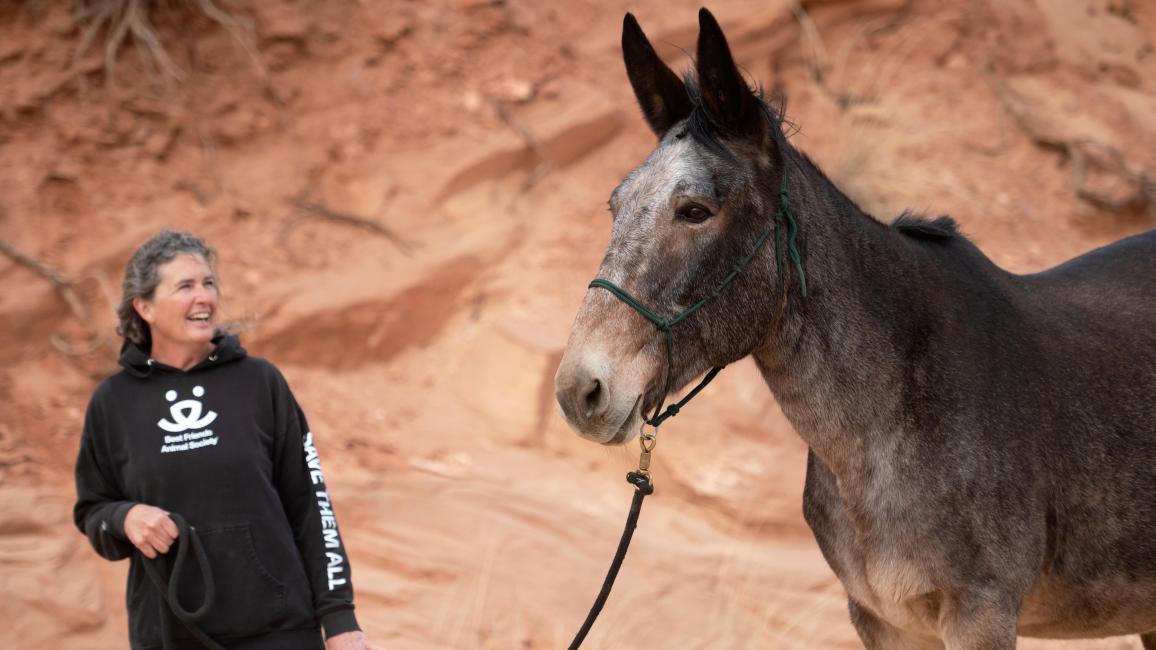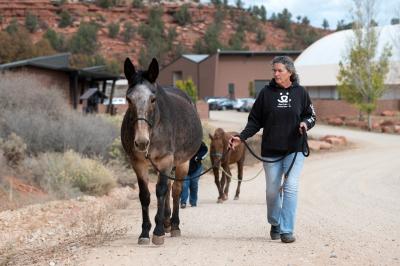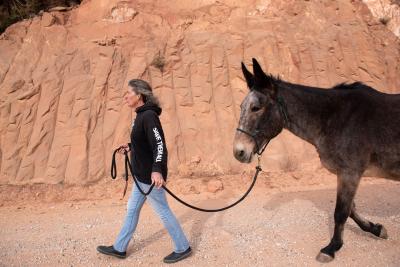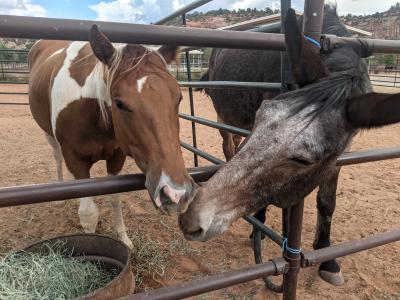U.S Forest Service mule coasts into retirement

When it comes to working and hauling equipment in the back country along winding foot trails, mountain paths and beautifully uninterrupted fields, motorized vehicles don’t always fit the job description, especially when the job involves taking care of nature. That’s where pack horses and mules like Willow come in. The U.S. Forest Service employs teams of these hardworking equines (called “pack strings”) for everything from delivering camp supplies to human co-workers in the wilderness to carrying equipment for fighting wildfires.
For 20 years, Willow was the leader of her string, which operated in Nevada. Standing 17.2 hands (five feet seven inches at the top of her shoulders), she was the biggest mule in the group, and she took her position as the big boss seriously. She kept everyone headed in the right direction, was skilled at conflict management within the pack and helped with on-the-job training for the new, younger co-workers.
With her intimidating size and perceived responsibility to the group, she also took on the role of guardian, which included keeping an eye out for dangers on and off the trail. Once, when the team was hanging out in a pasture for winter break, a mountain lion, sneaking in looking for a possible easy snack, was made to tuck tail and run when Willow put one massive hoof down as if to say, “Not today.” (The big cat escaped uninjured, except perhaps for his pride.)
[7 questions and answers about horses at Best Friends]
During her time with the forest service, Willow carried her fair share of camping gear — lots and lots of camping gear. But over the years she also hauled a gas-powered jackhammer, a 400-pound generator and packs of fish to restock lakes. The only thing that ever gave her pause was when her fishy passengers needed a noisy bubbler, but even then, she steeled herself and delivered everyone to their destination. The only things she asked for along the way were some yummy treats and a good ear massage, both happily provided by her human co-workers.
At age 26, Willow began developing stiffness caused by arthritis in one of her shoulders. And while both of her teams — equine and human — hated to see her go, they knew it was time for her to retire.
Retirement options for mules in the U.S. Forest Service are rather limited. They can go to auction but cannot be directly adopted by a family or sold; however, they can be “donated” to nonprofit organizations. Fortunately, the division Willow was working in already had a long-established relationship with Jen Reid, manager of Horse Haven at Best Friends Animal Sanctuary.
“For quite a few years this particular office, when … (equines are) ready to retire, has reached out to us,” says Jen. Oftentimes, the forest service already has an adopter lined up for the retiree, and Best Friends becomes the intermediary between work and a retirement home. In Willow’s case, though, the Sanctuary would become her home-between-homes.

Retirement home-between-homes
Willow’s retirement was a big deal. Her human co-workers threw her a party (with plenty of good snacks for the star of the show), and she was even interviewed for a story in the local paper, which mentioned all the work she’d done over the years. It was hard to say goodbye to such a beloved teammate and strong leader, but everyone knew she’d be in good hands.
“The fact that they went above and beyond to find her a safe place to land … is pretty awesome,” Jen says.
When Willow arrived at the Sanctuary, she already had some new fans waiting for her. Caregivers and volunteers had been looking forward to meeting the gentle giant since they’d heard about her. She didn’t disappoint. Willow was big and beautiful, sweet as sugar and immediately at ease in the canyon.
In fact, Willow seemed to realize quickly that she was done working, and she settled right into retirement life. When she moved into a pasture with an older (though much smaller) mule named Lucky and a curly-coated horse named Curly Sue (with no packs in sight), she happily relinquished her leadership role.
“She was always the boss. She was the big boss,” says Kristie Gerard, Horse Haven supervisor. “And here, she doesn’t want to have anything to do with that. She doesn’t want to be the boss. Curly Sue’s the boss.”
Willow was content to hang out with her new friends and follow their lead much like her equine teammates followed hers for so many years.
Her first time walking among the trees of the canyon, Willow lifted her head and drank in every sight and sound. It seemed, Kristie says, as though she found it all very familiar, like she was in her element. She was curious about everything, and without a mission to push her along, she took her time to enjoy the scenery.

Mama Willow
Despite no longer being the boss, Willow’s drive to protect hasn’t faded one bit, and she’s recently taken on an important, new role at the Sanctuary. They say retirement is the perfect chance to spend time with children and grandchildren, and Willow has embraced that by befriending a youngster. When an orphaned foal named Oakley arrived and then needed some downtime after surgery, Willow immediately took her under her wing.
Though a fence separates them (for now), Willow spends almost all of her time right by Oakley, gently nickering at and nuzzling the young mare through the fence. “Oakley needed to be on stall rest for a few months,” says Jen. “So, we set it up in a way that she could have friends over the fence, which included Miss Willow, who just adores her. Lucky mule and Willow mule take turns spending time with Oakley, and they love her.”
The quiet, relaxed life suits Willow. Since she no longer does long treks with heavy packs, she might have put on a couple of pounds. But who can really blame her for taking full advantage of retirement? Instead, Willow’s caregivers and volunteer friends make sure she gets exercise with leisurely strolls along the canyon roads and trails, her new, “stringless” herd by her side.

Make a difference for equines
By joining Best Friends, you can make a difference in the lives of mules like Willow and other animals.
Read more
Wild mustang mares and foals make Best Friends their winter rest stop